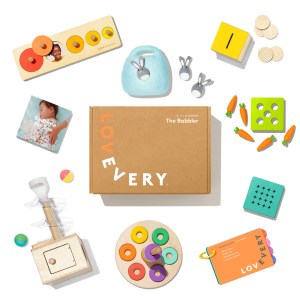8 ways for your toddler to (safely) play with small objects

Toddlers are often fascinated by tiny things—a little bug on the sidewalk, the zipper pull on your jacket, or even a piece of lint on the floor. This interest is a natural aspect of their development 🙂
According to the Montessori early learning philosophy, the sensitive period for small objects occurs between 1 and 3 years. During this stage, young children are tuned into minute details that adults often overlook. Holding and examining small toys allows your toddler to take in and categorize new information as well as practice fine motor skills.
Of course, the challenge is how to keep them safe as they explore. Try these ideas to help your toddler play safely with miniature things at home or on the go.
Safety note: Always keep a close eye on your toddler during these activities to make sure they don’t put any objects in their mouth, nose, or eyes. Small items can be choking hazards. Put them safely away when play is done.
Here are some ways for your toddler to play safely with small objects:
1. Grab bag
Fill the Felt Burrow from The Babbler Play Kit with an assortment of interesting objects, like the coins, carrots, and trees from the Wooden Coin Bank Set. Encourage your toddler to reach inside to pull out the treasures. Your child strengthens their fine motor skills as they maneuver their hand and wrist to pull objects through the opening.
2. Push play
Cut holes in the lid of an empty oatmeal canister or any similar container. Pull out your child’s small baby spoons and show them how to push each spoon through the hole in the lid. This activity helps your toddler practice hand-eye coordination as they orient the spoon to fit through the hole. If your toddler loves putting coins into the Wooden Coin Bank, this activity helps them practice a similar pushing motion.
3. Toy rescue
Using painter’s tape, adhere small animal figures or blocks from The Block Set to a baking sheet or piece of cardboard. Encourage your toddler to discover how to remove the tape to “rescue” the toy. Your toddler uses the tiny muscles of their fingers to pry off the tape—an excellent fine motor challenge.
4. Treasure box
Many toddlers love storing their small objects in a “treasure box” with a lid they can open and close. Use an empty wipes container as a place for your child to store and play with smaller toys. Fill it with any toddler-safe items, like the rings from the Flexible Wooden Stacker or bunnies from the Felt Burrow. Your toddler will likely enjoy dumping out all the toys and returning them to the box.
5. Felt pockets

Make simple felt pockets by using fabric glue to adhere the edges of two square pieces of felt or any colourful fabric. Lay out a few small objects that fit inside the pockets, like the rings from the Flexible Wooden Stacker or the trees from the Wooden Coin Bank. Show your toddler how they can fit these objects into the pockets. This may be a bit of a challenge at first, but it’s a fun way for your toddler to practice the enveloping play schema.
6. Small item scoop
Combine your toddler’s love of small objects with an opportunity to practice scooping. Fill a muffin tin with O-shaped cereal and add assorted small measuring cups, scoops, or spoons. Invite your toddler to scoop and pour the cereal between the muffin cups or into piles.
7. Pincer puzzle hide-and-seek
Hide one piece of O-cereal under the top of the First Puzzle from The Inspector Play Kit—or any puzzle piece that fits into a base. Encourage your toddler to remove the top to find the surprise hidden beneath.
8. Key ring fun
If your toddler is fascinated with small objects, it might be time to bring out the Stainless Steel Jingle Keys from The Explorer Play Kit once again. With their improved fine motor skills, they may enjoy manipulating the keys. Try making fun sounds as your toddler moves the keys around the ring: “Zoom! Swish! Clink!” Speech and language experts encourage these types of sounds since they catch a child’s attention and are fun to imitate.
In this post

The Babbler Play Kit
The Babbler Play Kit, designed with your child’s development in mind, is full of playthings and activities that tap into the magic world of a brand-new one-year-old. See what’s inside!
Learn morePosted in: 13 - 15 Months, Crafts, Fine Motor, Matching, Playtime & Activities, Sorting, Child Development
Keep reading

13 - 15 Months
There’s no such thing as bad weather, just bad clothing
Research shows that children benefit from playing outside, regardless of the season. Learn how to keep playing outdoors even when the weather is cold or rainy.


13 - 15 Months
Welcome to The Babbler Play Kit for months 13-15
Watch Lovevery CEO Jessica Rolph introduce the Babbler Play Kit for months 13 to 15 of your toddler's life.

13 - 15 Months
Your toddler’s on top of the world when they make you laugh
A toddler's budding sense of humor is a sign of their cognitive, social, and emotional development. Learn five ways to help nurture your child's funny bone.
